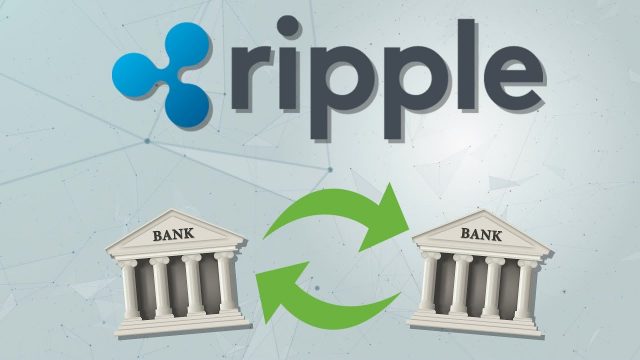
When Banking Industry Disappears, Will Ripple (XRP) Take Over?

Ripple (XRP) – The way banks operate is beginning to change especially in advanced countries where technology is taking every bit of financial transaction. We all want to send money to another country and see it delivered in microseconds, or possibly send a million dollar from faraway Australia and hear a good news from the recipient in less than a minute. These are not available in conventional banking systems. The usual conventional banks’ mode of operation makes remittance slower than the speed of snail.
Today, the world bellows for a better system that makes it possible for money to be delivered in no time, however, wherever this technological system is deployed, the archaic system must shift or fade into obscurity. This is the view of many senior executive bankers who now see opportunities in cryptocurrency. Marcus Schenck, co-head of corporate and investment banking at Deutsche Bank, in his opinion says bank accounts could disappear in as little as five years.
“The week before last I was in China, and saw a company that is producing microchips that are used for bitcoin mining, or any type of blockchain technology,” he told Bloomberg.
“There’s a thesis that at some stage in 5, 10, 15, 20 years — who knows — accounts will disappear, and be replaced.”
The information that conventional banking style will fade away makes us think of the next thing to proffer when nothing like bank accounts exist, after every banking transactions moves in milliseconds through blockchain technology.
Then what cryptocurrency, what ideas will stay atop no matter what? What blockchain technology will capture the minds of the world and achieve banking coordination without any stress?
Let’s Imagine Ripple?
When we look around today, we see thousands of altcoins been buried from day one their ICOs were announced. This has generated many a number of FUD from different people, especially successful people of the world, financial experts, and even governments.
Nobel Prize winning economist, Robert Shiller, in January at the World Economic Forum in Davos said he “tend to think of bitcoin as an experiment. It is an interesting experiment, but it’s not a permanent feature of our lives.”
Not that alone, Billionaire investor, Warren Buffett in an interview with CNBC said he “can say almost with certainty that cryptocurrencies will come to a bad end.”
There FUDs are because many of them, those who haul inventive on cryptocurrency, actually perceived that the disruption of the banking industry is on the way, with possibilities of these millionaires losing their wealth to tremors that the cryptocoins would create when things dance to the tune of blockchain. One very cryptocoin that has the potential of creating disruption in the banking sector is Ripple. According to observer, Ripple is already in a direct competition with banks, and it is already creating a scary scene for them.
“If big banks were to succeed in crushing one of these two currencies, Ripple would be it,” says Shidan Gouran, President, and COO of Global Blockchain.
“The main reason for this is because Ripple is much more of a direct competitor to banks. Because it operates more like a transaction network than a currency, it’s a lot more plausible that they will be a target for banks to get tough with. Whereas because Bitcoin operates more like a currency, they don’t pose the same threat.”
Going by different observations, skeptics are wrong in the way they look down on cryptocurrencies, Ripple especially. Ripple has an edge over all other cryptocurrencies due to its relationship with world’s top banks and series of tools the firm is centering on remittance. Ripple is preparing ahead of all possible odds that may happen in the nearest future. The team behind Ripple understands the ins and outs of the financial sector. That is the reason the cryptocurrency platform says it is targeting banks with its tools like xRapid and xCurrent.
One very issue that should make us realize that Ripple is thinking ahead of future problems is the above raised prediction by German top banker, Marcus, who said may be in 5, 10, 15, 20 years, accounts (bank account will be replaced by wallets) will no longer exist. This summation of his is not meeting Ripple unprepared.
Ripple’s CEO Brad Garlinghouse has aired that in the next five years, his firm would have partnered more than half of world’s bank.
What is Ripple’s Partnership With Bank Going To Look Like In The Next Five Years?
Ripple is no new name in the financial sector, the blockchain company has been coasting the financial sector since 2012 when it was launched. Looking at blockchain’s newly devised tools, they offer dependable blockchain solutions banks all over the work can subscribe to. This view tallies with that of Darren Marble, CEO of CrowdfundX when he regarded Ripple as the next big bang for banking industry.
Ripple, through its “Internet of Value” aims at using blockchain to manage global financial circulatory system. Ripple means business. Since the financial company declared readiness to change our views, perceptions, and the way we send money. It is achieving this through worthwhile partnership with respect banks in the world.
Chief Executive Officer Brad Garlinghouse in January said it would be partnering with 100 banks to create a better payment industry that depends solely on blockchain. This, according to him, is desired by clients, which our banks have not been able to achieve.
“Ripple is trying to be a catalyst to mature a whole industry. The current system is fraught with friction and is measured by a lack of transparency and speed.”
Ahead of what may happen to the banking industry, Ripple has fully deployed different tools and it is at the same time partnering with world’s top banks to change the way we see the industry –slow, shady, and with killing charges. When banks fade out, there is high percent Ripple takes over.